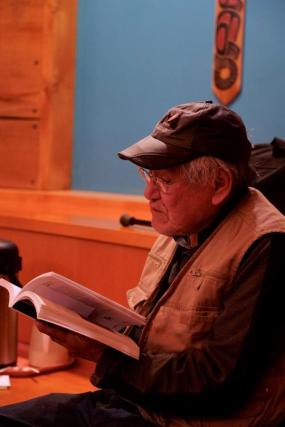The word ‘resilience’ describes the ability to adapt or recover in the face of adversity. In the world of Alzheimer’s research, resilience refers to the brain’s capacity to do just that. A person is considered resilient if they are aging in better health than would be expected: they seem to have a strong neurological buffer, called “cognitive reserve,” that helps maintain memory and thinking functions despite the presence of brain changes that typically cause decline.

Courtesy, Krystal Koop (Makah)
At the ADRC, we want to understand the modifiable factors that can promote or decrease cognitive reserve across different populations. In a study published in the January 2025 Nature journal series Communications Psychology, ADRC researchers report findings from the first effort to measure and describe cognitive reserve in American Indians. Participants came from the Strong Heart Study, a longitudinal study of American Indians from the Northern Plains, Southern Plains, and Southwest.
“American Indians are especially strongly affected by dementia risk factors but also demonstrate important characteristics related to cognitive and psychological resilience,” says lead author Astrid Suchy-Dicey, PhD, an associate professor at Huntington Medical Research Institutes and co-lead of the ADRC Data Management & Statistics Core.
The team used a combination of scores from memory and thinking tests and brain images to assess brain health differences in American Indians from several Tribes. They were then able to compare people who seemed to be aging better than expected, termed ‘cognitively resilient,’ and people who seemed to be aging less well than expected.
The cognitively resilient group tended to have higher socioeconomic status and lower clinical risk factors. This group had more education, higher income, less diabetes, less depression, and less kidney disease. These findings fall in line with existing evidence that the brain connections underlying cognitive reserve develop in early childhood and over a lifetime through education but can be undermined by socioeconomic deprivation and chronic stress.
This study adds complexity to researchers’ understanding of resilience. The team tested several metrics of brain health to find what showed the strongest links to cognitive reserve in this population. “We were surprised that these different ways to describe the concept of cognitive reserve were so different in patterns of association with sociodemographic and clinical factors,” said Suchy-Dicey. “A better understanding of these patterns of risk and resilience can help to identify strengths and weaknesses that may be useful in targeting prevention and treatment programs, either for the population, or for select subgroups at higher risk.”
Now ADRC researchers want to know if these findings apply to other Tribes and populations. One of their key questions is whether effectively addressing risk factors for vascular disease and dementia in American Indians can open new paths toward resilience in aging for future generations.
_
This study was funded, in part, by NIH grant P30 AG066509
Reference: Suchy-Dicey AM, Longstreth WT Jr, Buchwald DS, Rhoads K, Grabowski TJ. Cognitive reserve is associated with education, social determinants, and cognitive outcomes among older American Indians in the Strong Heart Study. Commun Psychol. 2025 Jan 28;3(1):14. doi: 10.1038/s44271-025-00198-6. PMID: 39875529; PMCID: PMC11775147.
_copy__lg.jpg)




